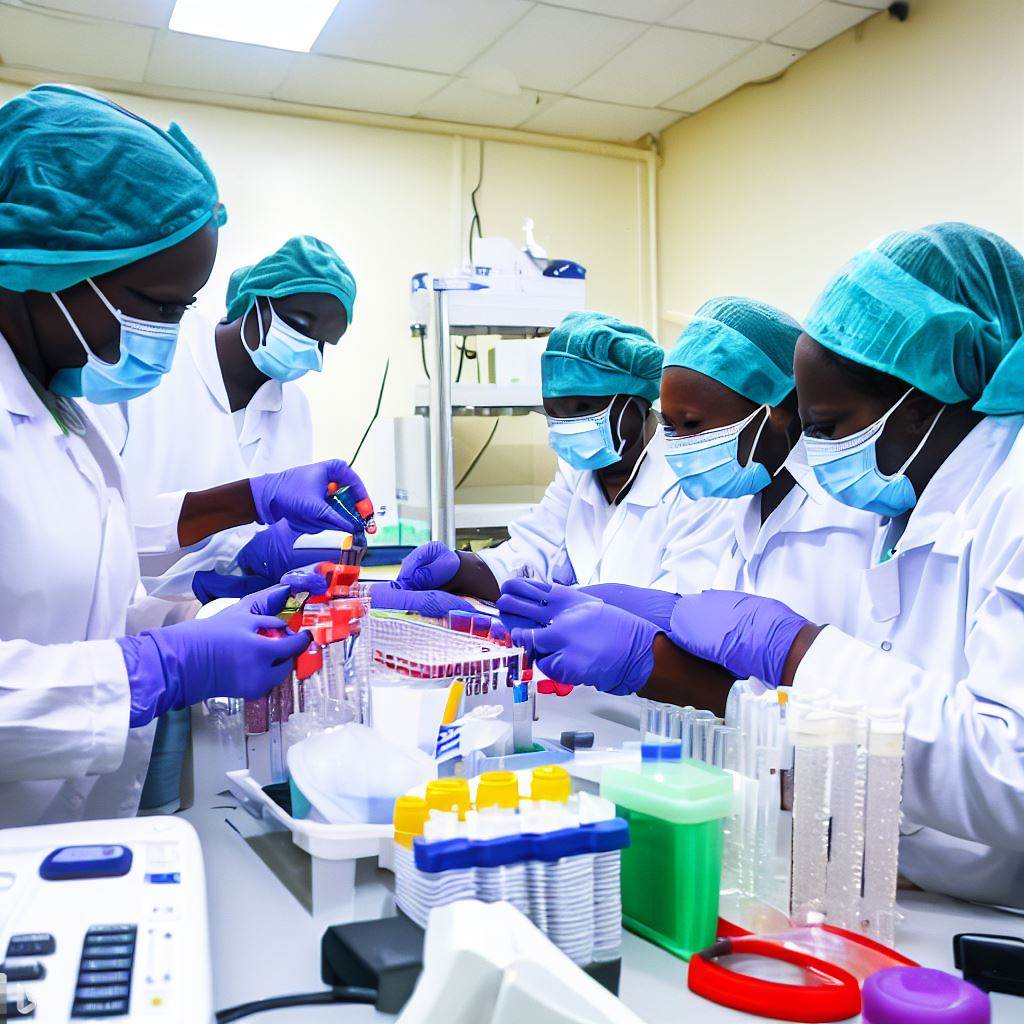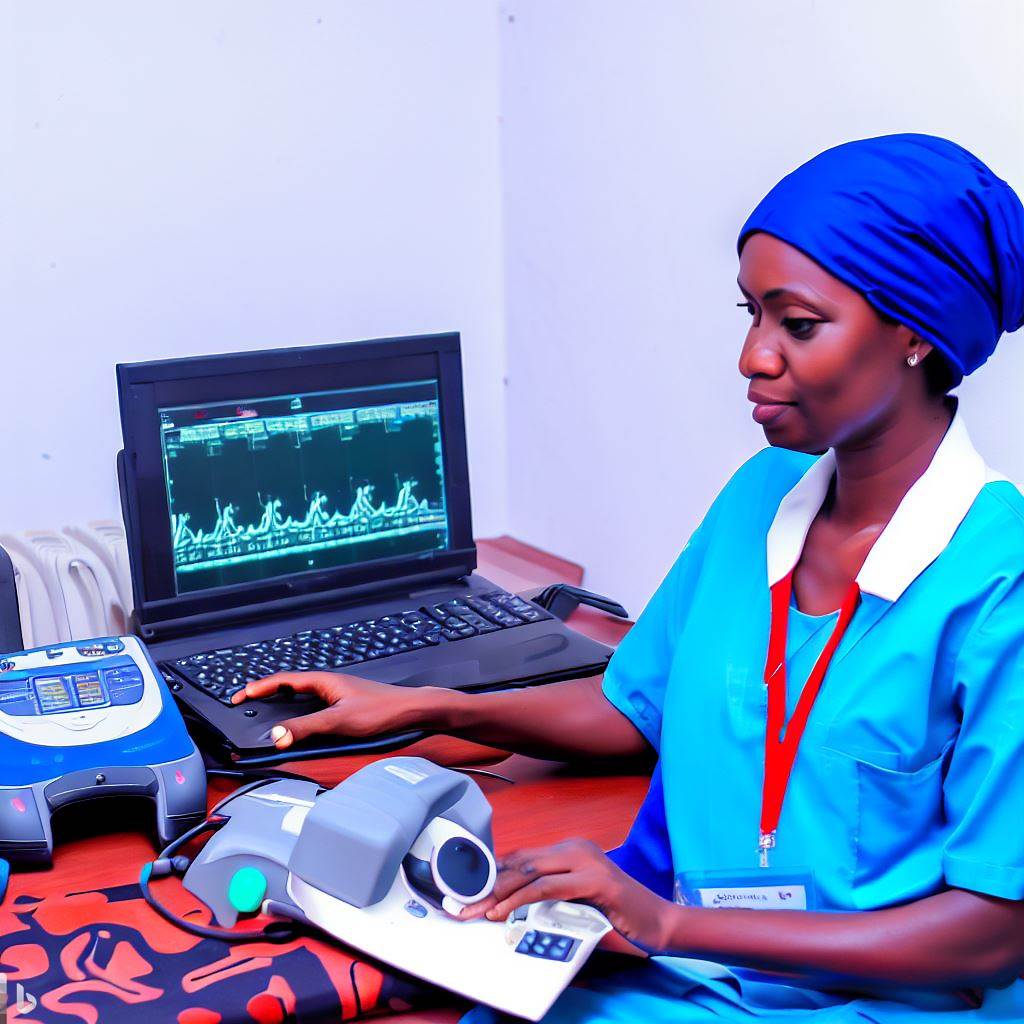Introduction
The attention-worthy topic Impact of Tech on Lab Technician Field emphasizes the crucial influence of technology in Nigeria’s lab technician field.
It is important to discuss this as it has significant implications for healthcare and scientific advancements in the country.
With the rapid advancement of technology globally, it has become essential to examine its impact specifically in the field of lab technicians in Nigeria.
Lab technicians play a vital role in the healthcare system, conducting various tests and providing accurate results to aid in diagnoses and treatment plans.
The introduction of technology in this field has revolutionized the way lab technicians carry out their work.
Automated machines and software have replaced traditional manual methods, enhancing efficiency and accuracy.
The Significance of this Topic
One significant impact of technology in this field is the improved turnaround time for test results.
With the use of automated machines, lab technicians can process samples faster, reducing waiting times for patients. Another area where technology has made a remarkable impact is the accuracy of results.
Automated machines and software eliminate human error, reducing the chances of misdiagnoses and ensuring more precise outcomes.
Furthermore, technology has also enhanced data management and record-keeping in the lab technician field.
Digital systems enable technicians to store and access patient data securely, making it easier to track and analyze trends, thus boosting research and development efforts.
Why it is Important to Discuss
It is crucial to discuss the impact of technology on Nigeria’s lab technician field as it can improve healthcare outcomes and contribute to the overall advancement of the country’s healthcare system.
By understanding the significance of technology in this field, stakeholders can make informed decisions to ensure its continued integration and optimal utilization.
Overview of Nigeria’s lab technician field
Lab technicians play a crucial role in the healthcare and medical institutions of Nigeria.
They are responsible for conducting various tests and experiments, providing accurate results, and assisting in the diagnosis and treatment of patients.
However, the field faces several challenges that hinder its growth and effectiveness.
Importance of lab technicians in healthcare and medical institutions
- Lab technicians are essential in the healthcare sector as they perform vital tests that help in diagnosing diseases and monitoring patients’ health.
- They provide accurate and reliable results, enabling doctors to make informed decisions regarding medication and treatment.
- Lab technicians also contribute to public health by conducting research, screening for diseases, and monitoring the safety of food and water.
Current challenges faced by lab technicians in Nigeria
- Lack of proper infrastructure and outdated equipment hinder the efficient functioning of lab technicians.
- There is a scarcity of skilled lab technicians due to a lack of training programs and low incentives.
- A shortage of funding and resources limits the ability of lab technicians to perform their duties effectively.
- Lab technicians often face inadequate recognition and appreciation for their contributions to healthcare.
- The lack of standardized protocols and quality control measures can lead to inconsistent and unreliable test results.
In the end, lab technicians play a crucial role in Nigeria’s healthcare system. They are responsible for conducting tests, providing accurate results, and contributing to public health.
However, the field faces several challenges including a lack of infrastructure, shortage of skilled technicians, and inadequate resources.
Addressing these challenges is essential to ensure the growth and effectiveness of Nigeria’s lab technician field.
Read: The Role of Lab Technicians in Nigeria’s Healthcare
Historical Background of Technology Adoption in Nigeria
The journey of technology adoption in Nigeria can be traced back to its colonial era. During this period, the country was introduced to basic technological advancements brought by the colonizers.
However, it was not until Nigeria gained independence in 1960 that significant technological advancements started taking place.
Since then, Nigeria has witnessed remarkable progress in adopting and integrating technology into various sectors of the country.
The advancements have undoubtedly impacted different industries, including the field of lab technicians. Below are some key highlights of how technology has transformed Nigeria’s lab technician field.
Improved Laboratory Equipment
With technological advancements, lab technicians now have access to state-of-the-art equipment and tools that enhance their work.
This includes advanced microscopes, automated analyzers, and precision measuring instruments, which allow for more accurate and efficient lab testing.
Digitization of Documentation
Gone are the days when lab technicians had to rely on manual paperwork and records.
Technology has enabled the digitization of documentation, leading to better record-keeping, easy retrieval of data, and reduced chances of errors.
Lab technicians can now access patient information and test results at the click of a button.
Enhanced Research and Development
Technological advancements have fueled research and development activities in the lab technician field.
With access to the internet and digital libraries, lab technicians can now easily access scientific literature, studies, and research findings from around the world.
This has led to the development of new testing methodologies and improved diagnostic techniques.
Automation of Processes
Technology has automated numerous lab processes, saving time and reducing human errors.
Automated machines now handle repetitive tasks, such as sample handling, pipetting, and mixing, with greater precision and consistency.
This has increased productivity and allowed lab technicians to focus more on complex analyses and interpretation of results.
Telemedicine and Remote Diagnosis
One of the significant impacts of technology in the lab technician field is the emergence of telemedicine and remote diagnosis.
Through video conferencing and sharing of test results electronically, lab technicians can collaborate with doctors and specialists from different locations.
This has improved patient care, especially in remote areas where access to specialized healthcare is limited.
Quality Assurance and Standardization
Technology has played a crucial role in ensuring quality assurance and standardization in lab testing.
Through the use of automated quality control systems, lab technicians can regularly monitor and validate the accuracy and reliability of their test results.
This helps to maintain high standards and consistency in the lab technician field.
Training and Education
Technology has revolutionized training and education for lab technicians.
Online platforms and virtual classrooms provide easy access to learning resources and opportunities for continuing professional development.
Lab technicians can now enhance their skills and stay updated with the latest advancements and best practices in their field.
In review, Nigeria has come a long way in adopting and integrating technology into various sectors, including the lab technician field.
The advancements have brought about improved equipment, digitization of documentation, enhanced research and development, automation of processes, telemedicine, quality assurance, and improved training and education.
As technology continues to evolve, it is essential for lab technicians to embrace these advancements and adapt to the changing landscape to ensure the delivery of efficient and accurate testing services.
Read: The Future of Diagnostic Medical Sonography in Nigeria
Current technological landscape in the lab technician field
The lab technician field in Nigeria is experiencing significant changes due to the impact of technology. The current state of technology in Nigeria’s lab technician field is highly advanced and rapidly evolving.
Many labs have adopted digital systems, automation, and other technological tools to improve their efficiency and accuracy.
The integration of technology in the lab technician field has several benefits.
- Improved accuracy and precision in test results
- Enhanced efficiency and reduced turnaround time
- Access to a wider range of tests and diagnostic tools
- Streamlined data management and record-keeping
- Greater connectivity and collaboration between labs and healthcare providers
Despite these benefits, there are also challenges associated with the integration of technology in the lab technician field.
- High initial costs of implementing technology systems
- Training and skill development for lab technicians to effectively use the technology
- Maintenance and upkeep of technological equipment
- Data security and privacy concerns with digital systems
- Resistance to change and reluctance to adopt new technology among lab technicians
Digital systems and automation revolutionized lab technician work, enabling quicker and more accurate tests and analysis.
Advanced machinery enhances capabilities, offering a broader range of diagnostic services. Monitoring and tracking test results ensure prompt delivery to healthcare providers.
Electronic health records boost data management efficiency and reduce errors. Technology facilitates collaboration between labs and healthcare providers, enabling faster and more accurate diagnoses.
Challenges include high initial costs, resource constraints, and the need for effective training. Maintenance and upkeep of equipment can be costly, requiring regular investments.
Data security and privacy concerns are significant; proper safeguards must be in place. Address resistance to change among lab technicians accustomed to traditional methods.
Nigeria’s lab technician field can greatly benefit from technology advancements with planning, investment, and training.
Harnessing technology’s power will lead to improved patient outcomes and a more efficient healthcare system.
Read: Challenges Faced by Clinical Lab Technicians in Nigeria
The positive impacts of technology on lab technicians
How Technology has Improved Efficiency and Accuracy in Lab Work
Technology has had a significant impact on Nigeria’s lab technician field, bringing about numerous positive changes.
Lab technicians play a crucial role in collecting, analyzing, and interpreting data for various purposes, including medical and scientific research.
The advent of technology has revolutionized their practices, making them more efficient and accurate.
One of the key positive impacts of technology on lab technicians is the improvement in efficiency and accuracy in lab work.
With the introduction of advanced equipment and automated systems, lab technicians can now perform tasks much faster and with greater precision.
For example, sophisticated machines can conduct multiple tests simultaneously, reducing the time required for analysis.
How Technology has Reduced Human Errors and Increased Productivity
Furthermore, technology has significantly reduced human errors in lab work, leading to increased productivity.
In the past, lab technicians had to rely heavily on manual processes, which were prone to errors. However, with the integration of technology, tasks that were cumbersome and error-prone can now be automated.
This reduces the chances of mistakes and ensures more reliable results.
Technology empowers lab technicians to analyze results effectively with advanced software processing vast data, identifying trends.
Enhanced accuracy aids diagnoses and research. Digital data storage streamlines workflows, fosters collaboration, and knowledge-sharing.
Teleconferencing enables remote consultations, global expertise access. Online courses and webinars foster continuous learning for professional development.
Nigeria’s lab technician field experiences far-reaching positive impacts. Advanced equipment and automated systems improve efficiency and accuracy.
Reduced human errors enhance productivity. Advanced software and data processing tools aid analysis and interpretation.
Improved record-keeping, remote access, and consultation. Opportunities for professional development. As technology evolves, lab technicians expect enhanced practices and capabilities.
Read: Current Trends in Nigeria’s Clinical Lab Tech Field

The challenges faced by lab technicians with the integration of technology
Lab technicians play a crucial role in Nigeria’s healthcare system, conducting essential diagnostic tests that aid in disease diagnosis and treatment.
However, with the rapid integration of technology, these professionals face numerous challenges that may hinder their efficiency and effectiveness in performing their duties.
Potential Issues and Challenges
- Limited access to advanced technology: Many lab technicians in Nigeria struggle to access the latest technological advancements due to financial constraints and inadequate infrastructure.
- Resistance to change: Resistance from technicians who are hesitant or resistant to adopting new technology can impede the successful integration of technology in laboratories.
- Insufficient training and skill development: Without proper training, lab technicians may struggle to utilize and adapt to advanced technology effectively.
- Interoperability issues: Incompatibility between different technology systems can create challenges in data sharing, analysis, and workflow management.
- Data security and privacy concerns: The integration of technology poses significant risks to the privacy and security of patient data, requiring comprehensive safeguards.
The Need for Proper Training and Education
To overcome these challenges, it is crucial to prioritize proper training and education for lab technicians in Nigeria.
By equipping them with the necessary skills, they can maximize the benefits of technology in their field.
- Upskilling programs: Regular upskilling programs and continuous professional development sessions can help lab technicians stay updated with the latest technology trends.
- Collaboration with technology providers: Collaborating with technology companies can facilitate customized training programs tailored to the specific needs of lab technicians.
- Support from healthcare institutions and government: Institutions and the government should invest in training programs and provide financial assistance to ensure lab technicians receive adequate training.
The Importance of Addressing Challenges for Sustainable Growth
Addressing the challenges faced by lab technicians with the adoption of technology is critical for the sustainable growth of Nigeria’s healthcare sector. By doing so, the following benefits can be achieved:
- Enhanced accuracy and efficiency: Advanced technology enables lab technicians to conduct tests more accurately and efficiently, improving diagnostic accuracy and patient care.
- Improved data management: Automation of data entry, storage, and analysis allows for better organization and accessibility of patient information.
- Streamlined workflows: Technology can optimize laboratory workflows, reducing turnaround times for test results and improving efficiency.
- Enhanced collaboration: Digital platforms and technology facilitate seamless collaboration and information sharing between lab technicians and healthcare professionals.
- Increased research capabilities: Access to advanced technology can foster research and innovation in the field, ultimately improving disease understanding and treatment in Nigeria.
In the end, the integration of technology in Nigeria’s lab technician field brings about both opportunities and challenges.
By addressing the potential issues and challenges faced by lab technicians and providing them with proper training and education, Nigeria can ensure sustainable growth and improved healthcare outcomes.
Read: The Journey to Becoming a Registered Nurse in Nigeria
Case Studies of Successful Tech Integration in Nigeria’s Lab Technician Field
Integrating technology in the lab technician field has brought significant advancements to healthcare institutions in Nigeria.
By embracing these advancements, healthcare organizations have witnessed improved efficiency, enhanced accuracy, and overall better operations.
Case Study: HealthARM Hospital
- Technology Integration: HealthARM Hospital implemented a laboratory information management system (LIMS) to streamline their lab technician processes.
- Efficiency Impact: The LIMS allows lab technicians to organize and track samples digitally, reducing manual paperwork and time spent searching for patient records.
As a result, the hospital’s lab turnaround time has significantly decreased. - Accuracy Improvement: The systematic recording of data in the LIMS ensures accurate patient identification and sample tracking, minimizing the risk of errors and mix-ups.
- Overall Operations: By integrating technology, HealthARM Hospital has optimized their lab operations, leading to improved patient satisfaction and better resource allocation.
Lagos General Hospital: A Case Study
- Technology Integration: Lagos General Hospital implemented automated laboratory equipment, such as advanced analyzers and robotic systems.
- Efficiency Impact: Automated equipment has significantly reduced the time required for lab tests. It enables lab technicians to perform multiple tests simultaneously, increasing output and efficiency.
- Accuracy Improvement: The precision and reliability of automated equipment have greatly enhanced the accuracy of lab test results. This has led to better diagnostics and improved patient care.
- Overall Operations: Lagos General Hospital’s integration of technology has resulted in shorter wait times, improved patient flow, and overall faster diagnosis and treatment.
Case Study: TechMed Clinic
- Technology Integration: TechMed Clinic adopted a mobile health (mHealth) app that allows lab technicians to receive and analyze test results on their smartphones or tablets.
- Efficiency Impact: Lab technicians can access test results instantly, without the need for physical paperwork or returning to the lab. This expedites the delivery of results to both patients and doctors.
- Accuracy Improvement: The mHealth app ensures real-time synchronization of data, reducing the risk of errors caused by manual transcription.
It also facilitates seamless communication between lab technicians and healthcare professionals. - Overall Operations: TechMed Clinic’s adoption of mHealth technology has streamlined their lab operations, resulting in faster turnaround times and improved collaboration among healthcare stakeholders.
In general, the successful integration of technology in Nigeria’s lab technician field has revolutionized healthcare practices.
Case studies like HealthARM Hospital, Lagos General Hospital, and TechMed Clinic exemplify the positive impact of technological advancements on efficiency, accuracy, and overall operations.
Embracing technology in the lab technician field is crucial for healthcare institutions to stay ahead in providing better patient care and contributing to the advancement of medical science in Nigeria.
Future Prospects and Recommendations
Future Prospects and Advancements in Nigeria’s Lab Technician Field
Introduction of more advanced laboratory equipment and technologies. Growing demand for lab technicians due to the increasing number of medical facilities.
Incorporation of artificial intelligence and machine learning in laboratory processes. Implementation of remote monitoring systems for real-time data analysis.
Integration of robotics and automation to streamline repetitive tasks. Introduction of virtual reality for enhanced training and simulations.
Development of personalized medicine through genetic testing and molecular diagnostics. Expansion of telemedicine services that require lab technicians for sample analysis.
Increased collaboration between lab technicians and other healthcare professionals for interdisciplinary research. Improvement in quality control and assurance practices to ensure accurate test results.
Recommendations for Lab Technicians, Healthcare Institutions, and the Government
- Continuous professional development programs for lab technicians to update their skills and knowledge.
- Creation of specialized training courses in the latest technologies and equipment.
- Establishment of partnerships between healthcare institutions and technology companies for research and development.
- Provision of adequate funding and resources for healthcare institutions to invest in advanced laboratory technologies.
- Development of regulations and standards to govern the integration of technology in laboratory processes.
- Support for the creation of laboratory technician associations to promote knowledge sharing and collaboration.
- Implementation of mentorship programs to encourage experienced lab technicians to guide and mentor new professionals.
- Collaboration between the government and educational institutions to enhance lab technician training programs.
- Integration of technology-related courses and subjects in lab technician education curriculum.
- Creation of incentives for lab technicians to adopt and embrace new technologies in their daily work.
Summary of Potential Benefits and Outcomes of Embracing Technology in the Lab Technician Field
Increased accuracy and precision in test results leading to improved diagnosis and patient care. Enhanced efficiency and productivity through automation of repetitive tasks.
Reduced turnaround time for test results, enabling faster treatment decision-making. Improved data management and analysis for better insights and research opportunities.
Greater accessibility to laboratory services through telemedicine and remote monitoring. Advanced training opportunities using simulation and virtual reality technologies.
Creation of more job opportunities for lab technicians due to technological advancements.
Enhanced collaboration between lab technicians and healthcare professionals, leading to improved patient outcomes.
Development of innovative and personalized treatments based on genetic testing and molecular diagnostics. Overall advancement of the healthcare system in Nigeria through the integration of technology.
In fact, the future prospects for Nigeria’s lab technician field are promising with the integration of technology.
By implementing advancements and following the recommendations provided, lab technicians, healthcare institutions, and the government can work together to reap the potential benefits and outcomes of embracing technology in this field.
The future of Nigeria’s lab technician field relies heavily on embracing and adapting to technological advancements for enhanced patient care and overall healthcare system development.
Conclusion
In summary, this blog post has highlighted the positive impact of technology on Nigeria’s lab technician field.
We have discussed how technology enhances efficiency, accuracy, and data management. Moreover, it has enabled remote testing, improved communication, and skill development.
Emphasizing the advantages, we can see that technology has revolutionized the lab technician field, leading to better healthcare outcomes in Nigeria.
However, it is important to note that ongoing research and discussion in this area are crucial to keep up with the ever-evolving technology and its impact.
By exploring further, we can continue to harness the positive effects of technology, improving the lab technician field in Nigeria and beyond.




